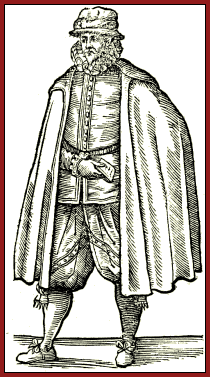The Steward in Matters Domestical
| A continuation of the duties laid down in Lord Montague's Book of Rules and Orders of 1595. |
 The Steward will at all times:
The Steward will at all times:
- Bear himself like the chief officer of a great house.
- Maintain a submissive and dutiful attitude towards his lordship and his wife and (to a lesser degree) the children, both as his own duty and to set an example to the rest of the staff. Assist his lordship with sound advice and great deliberation, and keep all his secrets.
- Hire and manage all domestic officers, servants and attendants and, when appropriate, recommend them for advancement (promotion).
- Be obeyed by every servant and officer in all things whatsoever, no matter how inconvenient, unless the task is dishonest, illegal or harmful to his lordship or his family.
- Regularly hold a staff meeting of the officers and domestic servants to encourage and remind them of their duties. Remind them that they want to do well for hope of reward and to contribute to both their own and his lordship's credit (good name).
- Admonish and correct negligent and disordered persons of any degree (both gentlemen and yeomen), and reform them by his grave and vigilant watch over them.
- He has some discretion in punishments, including suspending them from duties.
- When he finds them reformed, he can restore them to attendance.
- Bring the incorrigible and outrageous to his lordship for his direct consideration.
- No servant is ever to appear before his lordship out of livery.
- He has some discretion in punishments, including suspending them from duties.
- Give appropriate notice if he is going to be away from the house for longer than normal, so the master can find a replacement for the interim.
- He is not under any circumstances to appoint his own deputy.
- This is a replacement in terms of ordering of the household only, not for receipts and payments,
because he has to be accountable for those himself.
- He is not under any circumstances to appoint his own deputy.
- Appoint any of the household to carry messages to neighbors or elsewhere, with these stipulations:
- Never send a groom of the great chamber or of the wardrobe without informing the Gentleman Usher,
or send anyone by horse without informing the Gentleman of the Horse. This is so someone knows where the animal has gone, and so duties can be covered.
- Get permission in advance before sending any of his lordship's own chamber servants.
- Never send a groom of the great chamber or of the wardrobe without informing the Gentleman Usher,
or send anyone by horse without informing the Gentleman of the Horse. This is so someone knows where the animal has gone, and so duties can be covered.
- Share out at his discretion any gifts or rewards (vails) given by guests to the house.
- Take an inventory of all the plate and silver vessels in the house, including the weight and type, and goldsmith's mark on each, and make a copy for the Gentleman Usher and another for his lordship.
![]() Masters and Servants
Masters and Servants
![]() Greasing the Wheels
Greasing the Wheels
![]() Staffing a Great Household
Staffing a Great Household
![]() The Steward and His Office
The Steward and His Office
![]() Paying the Servants
Paying the Servants
![]() Dinner at Cowdray House
Dinner at Cowdray House
Sources
Scott: A Book of Orders and Rules





28 March 2008 mps
